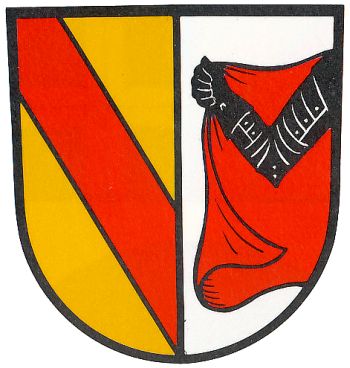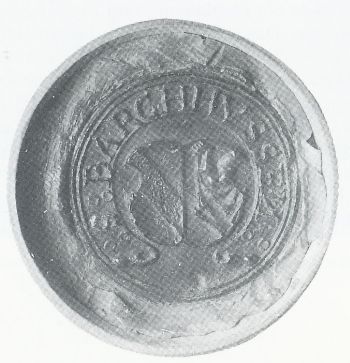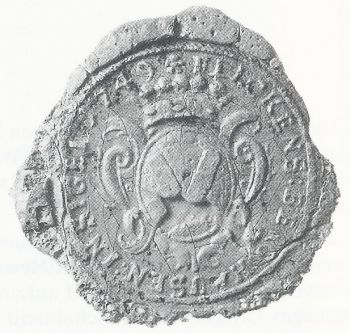Berghausen (Pfinztal): Difference between revisions
Knorrepoes (talk | contribs) m (Text replacement - "===Official blazon=== (de)" to "===Official blazon=== *(de)") |
Knorrepoes (talk | contribs) m (Text replacement - ". ===Origin/meaning===" to ". |- |'''English''' | {{blazon wanted}} |} ===Origin/meaning=== ") |
||
| Line 10: | Line 10: | ||
===Official blazon=== | ===Official blazon=== | ||
*(de) In gespaltenem Schild vorne in Gold ein roter Schrägbalken, hinten in Silber aus dem linken Schildrand wachsend ein geharnischter schwarzer Arm, der ein rotes Tuch hält. | *(de) In gespaltenem Schild vorne in Gold ein roter Schrägbalken, hinten in Silber aus dem linken Schildrand wachsend ein geharnischter schwarzer Arm, der ein rotes Tuch hält. | ||
|- | |||
|'''English''' | |||
| {{blazon wanted}} | |||
|} | |||
===Origin/meaning=== | ===Origin/meaning=== | ||
Berghausen is first mentioned in 770 and belongs since the 13<sup>th</sup> century to Baden. | Berghausen is first mentioned in 770 and belongs since the 13<sup>th</sup> century to Baden. | ||
Revision as of 07:31, 5 July 2022
This page is part of the German heraldry portal Deutsche Wappensammlung |
Heraldry of the World |
|
German heraldry:
|
Selected collector's items from Germany:
|
BERGHAUSEN
State : Baden-Württemberg
District (Kreis ) : Karlsruhe
Incorporated into : 1974 Pfinztal
Official blazon
- (de) In gespaltenem Schild vorne in Gold ein roter Schrägbalken, hinten in Silber aus dem linken Schildrand wachsend ein geharnischter schwarzer Arm, der ein rotes Tuch hält.
|- |English | (Pfinztal) No blazon/translation known. Please click here to send your (heraldic !) blazon or translation |}
Origin/meaning
Berghausen is first mentioned in 770 and belongs since the 13th century to Baden.
The arms show in the right part the arms of Baden, and in the left part partly the image of St.Martin, cutting his mantle for a beggar.
The composition first appears on the 16th century seal, in which part of the body of the saint is also visible. The second seal dates from the end of the 16th century and shows the same image. Between 1582 and 1749 no seals are known. In 1749 a new seal was made and it showed in a shield the letter V, the village sign used on border stones and the like. All other 18th and 19th century seals show the V as arms.
| The 16th century seal |
The seal from 1749 |
In 1901 the old arms were restored and in 1969 the colour of the arms was officially made black, as in 1901 the colour was not properly described.
Contact and Support
Partners:
Your logo here ?
Contact us
© since 1995, Heraldry of the World, Ralf Hartemink 
Index of the site
Literature : John, 1986














